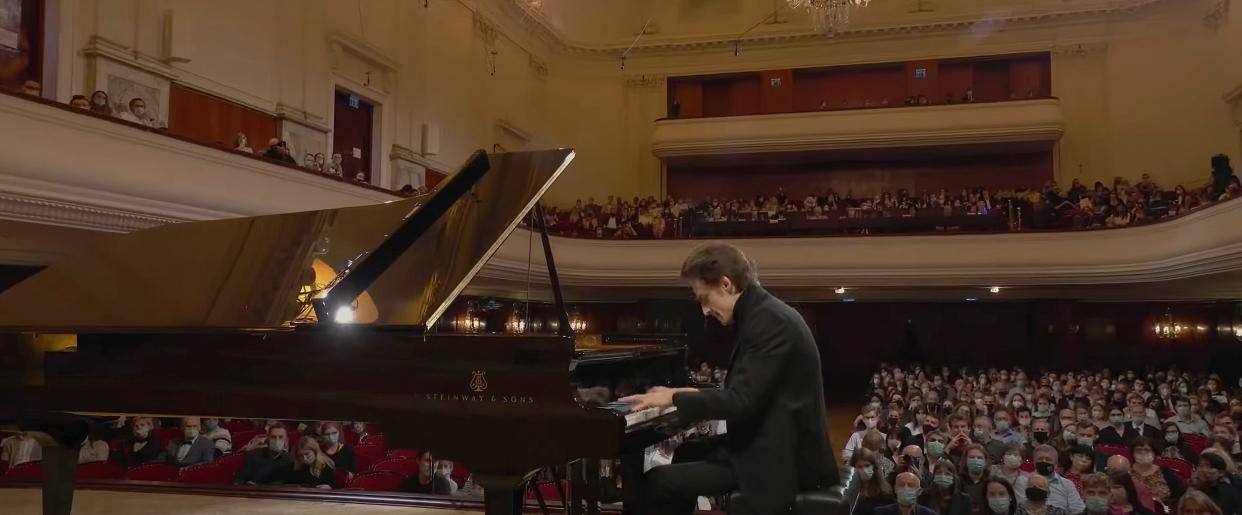‘Pianoforte’ Review: Competitive Piano Documentary Showcases the Utter Joylessness of Chasing a Dream

The International Chopin Piano Competition is the closest thing that concert pianists have to the Olympics. You might even say that, since the prestigious contest only happens every five years, the Olympics are the closest thing that athletes have to the International Chopin Piano Competition. Twice a decade, the world’s greatest virtuosos descend upon the city of Warsaw for a grueling three weeks of trials in which every mistake is placed under the world’s largest microscope. Contestants are limited to performing the works of Frédéric Chopin, so there’s little room to mask errors with creativity. Win the contest, and you’re on a fast track to classical music superstardom. Play a wrong note? Your dreams of glory are instantly dashed.
“Pianoforte,” Jakub Piatek’s documentary about the 2021 competition (postponed from its original 2020 date), follows a group of young musicians during their three weeks in Warsaw vying for the title. Utilizing a D. A. Pennebaker-esque format that eschews slick interviews in favor of letting intimate moments speak for themselves, the film has less to do with the glories of classical music than the burnout that inevitably hits anyone who devotes their life to a dream.
More from IndieWire
From the film’s opening scenes, it’s clear that playing piano at the highest levels is nothing short of a sport. The prodigies in “Pianoforte” begin their journeys by working out with personal trainers to perfect their posture and reflexes. They run through excruciatingly complicated scales as easily as we’d absentmindedly twirl a pencil. For the contestants, the intensity comes as naturally as breathing. Reaching the upper echelons of classical music before graduating high school means that these kids have never known a life that didn’t revolve around practicing piano.
But despite the massive stakes and nonexistent margin of error, “Pianoforte” is largely devoid of passion. The private coaching sessions lack the screaming intensity that “Whiplash” and “Mozart in the Jungle” led us to expect. Instead, coaches look at their star pupils with something closer to pity than perfectionism. A lifetime of practicing has turned the contestants into their own harshest critics. On the extremely rare occasion that someone makes a mistake, the look of self-loathing that instantly spreads across their faces is punishment enough.
As a film, “Pianoforte” does little to differentiate itself from other forgettable sports and music documentaries. It begins by following a large group of pianists, predictably whittling the pool down with each elimination round before revealing the winner and ending with the compulsory “Where Are They Now?” title cards. The musicianship on display throughout the film is every bit as remarkable as you might expect, but Piatek never finds a narrative in the footage that’s compelling enough to make us care about his subjects on a human level. That’s partially a result of the film following too many people and never letting us truly get to know someone before its 90-minute running time expires. But it also speaks to the very point that the contestants beg the film to make: It’s hard to present yourself as a Hollywood hero when a lifetime of perfectionism has robbed you of your passion.
The cold, clinical atmosphere that surrounds the entire film is a result of the fact that none of the pianists seem to have an explanation for why they do what they do. The film’s greatest achievement is the way it highlights the joylessness that can emerge from devoting one’s life to the pursuit of perfection. Many contestants admit that inertia and a lifelong desire to be the best at something is all that keeps them going, as both their love of piano and the pain of intense practice had faded into nothingness long before they set foot in Warsaw. Rather than Spielbergian romanticism or a Chazelle-esque exploration of sacrifice, the heart of “Pianoforte” is its willingness to linger in that empty void that gives some of us an inexplicable drive to keep pushing ourselves long after the thrill of achievement has vanished.
“It would be an incredible achievement,” one contestant said of winning the contest and securing the prize money that comes with it. “But then you’d have to use the 40,000 to go to therapy.”
Grade: B-
“Pianoforte” opens in select theaters from Greenwich Entertainment on Friday, December 1.
Best of IndieWire
Sign up for Indiewire's Newsletter. For the latest news, follow us on Facebook, Twitter, and Instagram.

